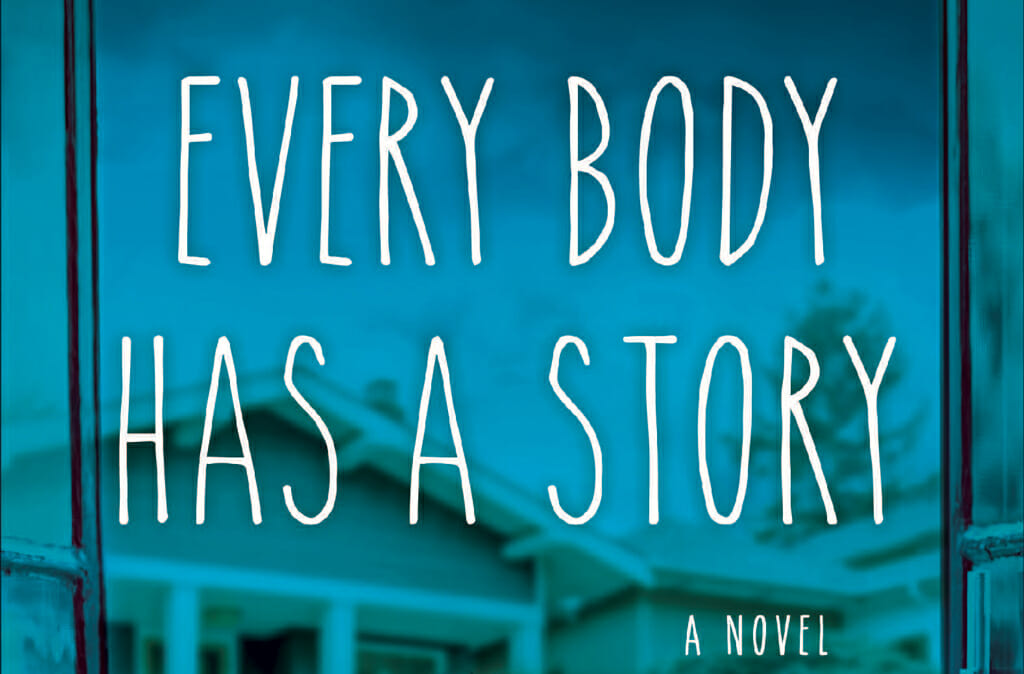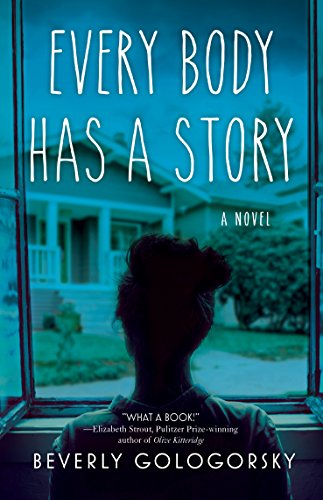‘Every Body Has a Story’: A Striking Depiction of American Poverty
Beverly Gologorsky's new book is "a rare working-class novel ... about the 2007-2009 foreclosure crisis and how it hit not those 'too big to fail,' but those too small not to be clobbered by it," writes TomDispatch editor Tom Engelhardt. Haymarket Books
Haymarket Books
Beverly Gologorsky’s “Every Body Has a Story” is “a rare working-class novel, probably the only one that will ever be written about the 2007-2009 foreclosure crisis and how it hit not those ‘too big to fail,’ but those too small not to be clobbered by it,” writes TomDispatch editor Tom Engelhardt. Below is an excerpt from the eleventh chapter of the novel. To read more by Gologorsky, check out her piece: What Does Poverty Feel Like?
The summer heat presses against the car windows. Clouds burden the sky. People are indoors with A/C or out in their bedroom-sized backyards. She pulls up in front of her house, tired from yet another day of job interviews out of too many days to count. Rain begins to splatter the windshield.
She hears loud voices and raucous laughter, and flashes on an old cartoon of a levitating house, floors shaking, furniture floating, windows expanding explosively. She pushes open the door. Lots of people making lots of noise. It’s a party no one’s told her about and in her house. She eyes the debris of paper plates and cups on unprotected surfaces, food-filled dishes that don’t belong to her, empty beer bottles strewn everywhere. Around here parties get wild.
A few table fans whirr to no effect.
Always a good actress—in school the best parts were hers—she leans against the front door. “Wow!”
Zack calls out, “It’s a party, enjoy.”
She stands there, a smile pasted on her face, thinking she needs a scotch, neat, and quick. Zack shoulders her into the crowd, then walks off before she can ask him what’s going on. Mumbling hello, touching arms, she weaves through clusters of people, social conditioning stronger than bewilderment. Most of them she’s met casually at the supermarket, school, somewhere, but she can’t remember who is who. Women in their thirties and forties in sun dresses or shorts and wedged shoes, summoned from their backyards. In fact the resemblance among them feels a bit eerie. The men, too, dressed for summer in cutoffs or shorts, tank tops, baseball caps, making it difficult to see their faces. Does she care? Only that she, too, would like to slip into something comfortable. She settles for removing her dress jacket and stepping out of her pumps.
“Mom,” Rosie whispers, “good entrance. Everyone thinks you’re glad to see them.”
She’s about to say, I am, but fooling Rosie isn’t that simple. She smiles at her daughter’s unblemished face, the doe-like eyes, so misrepresentative of the child’s temperament. “You think so?”
“Yeah, now you have to talk to people.”
“Rosie, why are these neighbors here?” She tries to keep the alarm out of her voice.
“Dad follows some instinct none of us share.”
“It looks like he went door to door inviting every neighbor. I hope people brought their own booze.”
“Whatever,” Rosie says and sidles over to chat with a man in his forties. She has no idea who he is, but it’s clear he can’t take his eyes off her daughter. “Rosie, I need another minute.”
“Here I come.” Her daughter sashays over.
“In the kitchen, please.”
And she follows Lena in.
“When did Dad invite these people?”
Rosie shrugs. “It was spur of the moment.”
“Why? Tell me.”
“It’s nothing. It’s just a party,” she says with a bit of disdain.
“I don’t want secrets.”
“Christ, Mom.”
“Tell me.” The mother’s no-shit stern voice.
“Honestly, I don’t know what hit Dad this morning, but he said we had to have a party. We needed to lighten up our lives. It would be potluck and he’d take care of inviting people. Happy now?”
“Why didn’t you call or text me?”
“Did you get the job?”
“No, and I don’t want any more surprises.”
“Forgive us our trespasses.”
“Don’t be snide.”
“You love spoiling anything nice others want to do.”
She stares at Rosie. “Oh, god, now isn’t the time for this.”
“Then we agree.” And Rosie saunters back over to the older man who is way too pleased to be speaking to a fifteen year-old.
As she moves to retrieve the scotch under the kitchen sink, her private stash for nights when sleep refuses to come, Zack taps her shoulder. “That bottle’s empty.”
“What the fuck’s going on?” she says.
“I put out everything we had. Someone brought bourbon. It’s on the table.” His eyes are a bit glazed.
“Have you lost your mind?”
“I thought you’d be pleased?” He stands there, T-shirt sticking to his chest, grinning, daring her to disagree.
“You must be kidding. We have no money for parties.”
“Rosie and Casey were sure you wouldn’t want it,” he goes on blithely. “I told the kids you don’t like giving parties but since they were doing the work and the neighbors were bringing the food . . . well . . . here we are.” He’s not really looking at her, and he doesn’t seem drunk. So what’s going on? She helps herself to the drink he’s holding, downing some kind of bitter, burning whiskey.
“You go out there and party, angel.”
“Zack, I need answers.”
“Answers will come soon enough.”
“What’s wrong?”
“Wrong? What in Christ’s name could be wrong? Lighten up.” His tone—loud and aggressive—is unusual. He walks away. Embarrassed, she reminds herself that these are not her real friends. So who cares? The whole scene is ludicrous. Has Zack gone nuts? She’s heard of men his age who suffer brain aneurysms that suddenly change their personalities, but he hasn’t complained of headaches, hasn’t stopped eating, and god knows, hasn’t lost interest in sex. He’s being willful, that’s what, and stupid, and she needs to catch her breath.
She finds a paper cup in the living room, fills it halfway with bourbon, drops in two ice cubes, grabs a slice of cheese from some neighbor’s carefully arrayed plate, and squeezes onto Casey’s chair. He, like her, probably can’t wait for everyone to leave.
Drinks in hand, people sprawl on the couch, chairs, the coffee table, the staircase; some lean on walls, others move around her house like they’ve been here a thousand times. It’s all a weird buzz.
Zack clinks his glass with a knife for silence. “Ladies and gentlemen, my wife is thirty-nine. In one year she’ll be officially middle-aged, but I’ll always be a year older. And what does that mean? What does any of it mean? Huh?” He rocks back on his heels, then looks around as if he actually expects an answer.
A cold fist of fear lodges inside her.
“Okay, here’s what I think. No, what I believe. No, what I’m proposing.
“I propose we dance. It’s a big room. It should be used. Why else buy a house? We can be as noisy as we want. No one upstairs or downstairs will complain. Move the limbs. Free the mind. Let’s do it.”
Zack turns the music up to blast, making it impossible to hear anyone. Casey looks at her with alarm.
She goes to the stereo and lowers the volume.
Zack jacks it up again. “Everyone dance,” he orders.
“Zack,” she shouts, “People want to talk.“
“Hey, what’s wrong with having a good time in my own house?” He’s shouting, too. “I own this house. Not really, of course. Like all of us, it’s only mine as long as I pay the rent. Oops, I mean the mortgage. Otherwise it’s the bank’s, or maybe the mortgage company’s. Who the fuck knows who owns what? I don’t. I do know that we have to use the space, man, gyrate like you mean it. I’m waiting.” He’s still shouting, though someone has again turned down the music, revealing a sudden church-like hush in the room. Her stomach’s in free fall now, her face flushed. She goes to Zack, though she’d like to run in the opposite direction.
“Casey, bring your dad some water. Zack, come sit with me.” She takes his arm.
“What the fuck, Lena.” He throws off her hand. “This is still my house. I want to dance. Rosie, come dance with your dad.”
“Dad, what if I make you a sandwich?”
“Hey, everyone, what’s happening, where’s the problem?” Zack shouts.
His eyes suddenly look bloodshot to her.
A flash memory of her mother undressing in the street.
People get it, thank god, and begin leaving. She goes to the door to say good night—it’s the least she can do—but says nothing more, only shakes her head as if to commiserate with her own problems. No one comments to embarrass her further and she feels a shiver of gratitude. Stepping outside with the last guest, she watches as some get into cars, others stroll home. She, too, would like to take off, walk for miles. The rain has stopped; the humidity’s without mercy. It’s a starless night. The only light comes from nearby houses.
Your support matters…Independent journalism is under threat and overshadowed by heavily funded mainstream media.
You can help level the playing field. Become a member.
Your tax-deductible contribution keeps us digging beneath the headlines to give you thought-provoking, investigative reporting and analysis that unearths what's really happening- without compromise.
Give today to support our courageous, independent journalists.







You need to be a supporter to comment.
There are currently no responses to this article.
Be the first to respond.